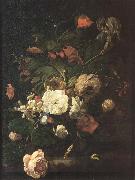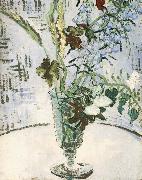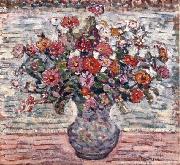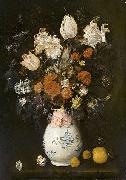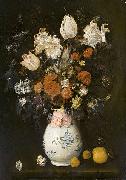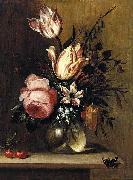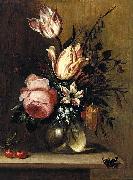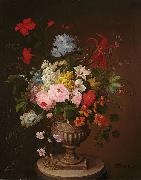Wholesale Oil Painting No Minimum |
|||||||||||
|
|
|||||||||||

|
|||||||||||
|
|
|
||||||||
Rachel RuyschDutch 1664-1750 Rachel Ruysch (June 3, 1664 ?? Amsterdam, August 12, 1750) was a Dutch artist who specialized in still-life paintings of flowers. She was born in The Hague, but moved to Amsterdam when she was three. Her father Frederik Ruysch, a famous anatomist, and botanist, was appointed a professor there. He gathered a huge collection of rarities in his house. She assisted her father decorating the prepared specimen in a liquor balsamicum with flowers and lace. At fifteen Ruysch was apprenticed to Willem van Aelst, a prominent Delft painter, known for his flower paintings. In 1693, she married a portrait painter, Juriaen Pool (1666-1745), with whom she had ten children. Her sister Pieternel was married to Jan Munnicks, a young man who drew flowers in the Hortus Botanicus Amsterdam. In 1701 Ruysch was inducted into the painters' guild in The Hague. Several years later Ruysch was invited to work for the court in D??sseldorf and serve as court painter to Johann Wilhelm, Elector Palatine. She remained working for him and his wife from 1708 until the prince's death in 1716. Also Jan Weenix and Adriaen van der Werff were invited to deliver paintings, after Eglon van der Neer died. In 1723 she won the lottery. Ruysch kept painting for her prominent clients. Ruysch lived eighty-five years and her dated works establish that she painted from the time she was a young woman until she was an octogenarian. About a hundred paintings by her are known. The background of the paintings are usually dark. Ruysch was also noted for her paintings of detailed and realistic crystal vases. |
||||||||
|
|
||||||||
Flowers in a vase
Flowers in a vase Painting ID:: 42718 |
MK169
1698 Cloth 5805x44.5cm MK169 1698 Cloth 5805x44.5cm |
|||||||
|
|
||||||||
Vincent Van GoghDutch Post-Impressionist Painter, 1853-1890 Vincent Willem van Gogh (30 March 1853 ?C 29 July 1890) was a Dutch Post-Impressionist artist. Some of his paintings are now among the world's best known, most popular and expensive works of art. Van Gogh spent his early adult life working for a firm of art dealers. After a brief spell as a teacher, he became a missionary worker in a very poor mining region. He did not embark upon a career as an artist until 1880. Initially, Van Gogh worked only with sombre colours, until he encountered Impressionism and Neo-Impressionism in Paris. He incorporated their brighter colours and style of painting into a uniquely recognizable style, which was fully developed during the time he spent at Arles, France. He produced more than 2,000 works, including around 900 paintings and 1,100 drawings and sketches, during the last ten years of his life. Most of his best-known works were produced in the final two years of his life, during which time he cut off part of his left ear following a breakdown in his friendship with Paul Gauguin. After this he suffered recurrent bouts of mental illness, which led to his suicide. The central figure in Van Gogh's life was his brother Theo, who continually and selflessly provided financial support. Their lifelong friendship is documented in numerous letters they exchanged from August 1872 onwards. Van Gogh is a pioneer of what came to be known as Expressionism. He had an enormous influence on 20th century art, especially on the Fauves and German Expressionists. |
||||||||
|
|
||||||||
|
|
Flowers in a vase
Flowers in a vase Painting ID:: 44990 |
mk183
Oil on canvas
40x31.1cm
mk183 Oil on canvas 40x31.1cm |
||||||
|
|
||||||||
Maurice PrendergastCanadian-born American Impressionist Painter, 1858-1924 American painter, printmaker, illustrator and designer of Canadian birth. He moved with his family to Boston in 1868 and was working as a commercial artist by 1886, lettering showcards, but his early attempts at watercolour foretold little of the talent that emerged after he travelled to Paris in January 1891. He studied for three years at the Atelier Colarossi under Gustave Courtois (1853-1923), and later at the Acad?mie Julian under Benjamin Constant, Joseph Blanc and Jean-Paul Laurens. |
||||||||
|
|
||||||||
|
|
Flowers in a Vase
Flowers in a Vase Painting ID:: 72553 |
Date between 1908(1908) and 1915(1915)
Medium Oil on canvas
Dimensions 59.1 X 64 cm (23.27 X 25.2 in)
cyf Date between 1908(1908) and 1915(1915) Medium Oil on canvas Dimensions 59.1 X 64 cm (23.27 X 25.2 in) cyf |
||||||
|
|
||||||||
Judith leyster1609-60 Dutch painter. She painted genre scenes, portraits and still-lifes, and she may also have made small etchings; no drawings by her are known. She specialized in small intimate genre scenes, usually with women seated by candlelight, and single half-length figures set against a neutral background. |
||||||||
|
|
||||||||
|
|
Flowers in a vase
Flowers in a vase Painting ID:: 84928 |
1654(1654)
Medium Oil on canvas
cyf 1654(1654) Medium Oil on canvas cyf |
||||||
|
|
||||||||
Judith leyster1609-60 Dutch painter. She painted genre scenes, portraits and still-lifes, and she may also have made small etchings; no drawings by her are known. She specialized in small intimate genre scenes, usually with women seated by candlelight, and single half-length figures set against a neutral background. |
||||||||
|
|
||||||||
|
|
Flowers in a vase
Flowers in a vase Painting ID:: 85064 |
1654(1654)
Medium Oil on canvas
cyf
1654(1654) Medium Oil on canvas cyf |
||||||
|
|
||||||||
Hans Bollongier(1600-idem, 1645) was a Dutch Golden Age still life flower painter. Bollongier was born in Haarlem. According to the RKD little is known of his early life. He became a member of the Haarlem Guild of St. Luke in 1623, and in 1675 his younger brother Horatio was named as his beneficiary. He was a specialist in bouquets of blooms. Paintings attributed to him that are not flower- or fruit still lifes are likely the work of his brother Horatio.He was an important influence on the later flower painters known as the monogrammist JF and Anthony Claesz II. He painted during a period of great productivity for Haarlem painters, during the decades after Karel van Mander published his Schilderboeck there. In Karel van Mander's book, there were a set of rules to follow to create good paintings and good drawings. Bollongier developed his own style and still observed all of these rules. His paintings were very popular, but his work was not regarded as such by contemporary Haarlem painters. As a genre, still life painting was considered inferior to historical allegories. His work today is considered part of the proof that Tulip Mania took place, although there is reason to believe that this is also just part of early Haarlem tourist propaganda. Even as early as the 17th century, gentry from Amsterdam, Leiden, and places farther away enjoyed visiting the tulip fields of Haarlem in the Spring, and paintings of tulips were as popular as the bulbs. |
||||||||
|
|
||||||||
|
|
Flowers in a Vase
Flowers in a Vase Painting ID:: 85182 |
Date c. 1660(1660)
Medium Oil on oak panel
Dimensions Height: 33 cm (13 in). Width: 26 cm (10.2 in).
cjr Date c. 1660(1660) Medium Oil on oak panel Dimensions Height: 33 cm (13 in). Width: 26 cm (10.2 in). cjr |
||||||
|
|
||||||||
Hans Bollongier(1600-idem, 1645) was a Dutch Golden Age still life flower painter. Bollongier was born in Haarlem. According to the RKD little is known of his early life. He became a member of the Haarlem Guild of St. Luke in 1623, and in 1675 his younger brother Horatio was named as his beneficiary. He was a specialist in bouquets of blooms. Paintings attributed to him that are not flower- or fruit still lifes are likely the work of his brother Horatio.He was an important influence on the later flower painters known as the monogrammist JF and Anthony Claesz II. He painted during a period of great productivity for Haarlem painters, during the decades after Karel van Mander published his Schilderboeck there. In Karel van Mander's book, there were a set of rules to follow to create good paintings and good drawings. Bollongier developed his own style and still observed all of these rules. His paintings were very popular, but his work was not regarded as such by contemporary Haarlem painters. As a genre, still life painting was considered inferior to historical allegories. His work today is considered part of the proof that Tulip Mania took place, although there is reason to believe that this is also just part of early Haarlem tourist propaganda. Even as early as the 17th century, gentry from Amsterdam, Leiden, and places farther away enjoyed visiting the tulip fields of Haarlem in the Spring, and paintings of tulips were as popular as the bulbs. |
||||||||
|
|
||||||||
|
|
Flowers in a Vase
Flowers in a Vase Painting ID:: 89493 |
1660(1660)
Medium oil on oak panel
cyf 1660(1660) Medium oil on oak panel cyf |
||||||
|
|
||||||||
Edward Beyerpainted The Peaks of Otter and the Town of Liberty in 1855 |
||||||||
|
|
||||||||
|
|
Flowers in a vase
Flowers in a vase Painting ID:: 92005 |
1823(1823)
Medium oil on canvas
Dimensions 81 X 66 cm (31.9 X 26 in)
cyf 1823(1823) Medium oil on canvas Dimensions 81 X 66 cm (31.9 X 26 in) cyf |
||||||
|
|
||||||||
|
Edward Beyer painted The Peaks of Otter and the Town of Liberty in 1855 Flowers in a vase 1823(1823) Medium oil on canvas Dimensions 81 X 66 cm (31.9 X 26 in) cyf |
||||||||
|
|
||||||||
|
Prev Next
|
||||||||
|
|
||||||||
|
Related Paintings to Edward Beyer :. |
||||||||
|
|
||||||||
|
CONTACT US |
